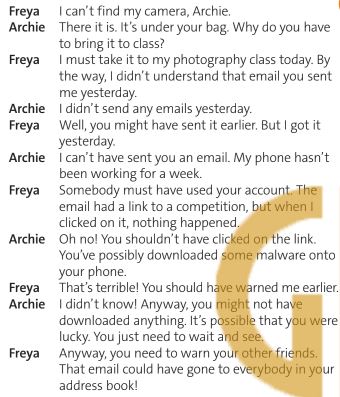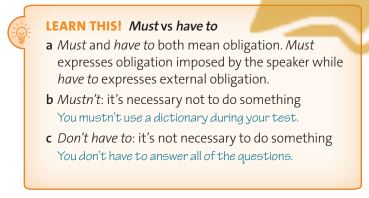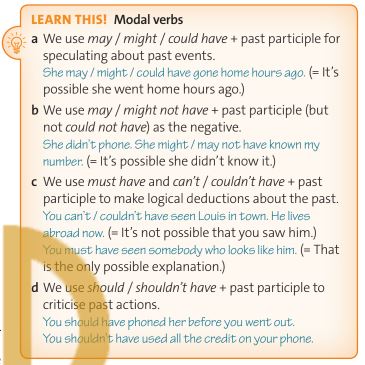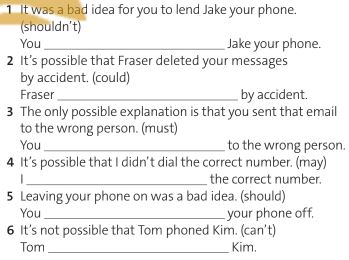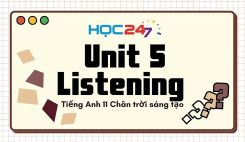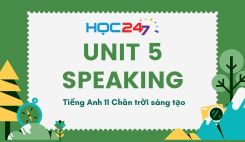C├╣ng HOC247 cß╗¦ng cß╗æ v├Ā mß╗¤ rß╗Öng th├¬m kiß║┐n thß╗®c vß╗ü c├Īc ─æß╗Öng tß╗½ chß╗ē sß╗▒ bß║»t buß╗Öc ŌĆ£must vs have toŌĆØ c├╣ng nhŲ░ nhß╗»ng ─æß╗Öng tß╗½ khiß║┐m khuyß║┐t ─æŲ░ß╗Żc sß╗Ł dß╗źng trong th├¼ qu├Ī khß╗® th├┤ng qua nß╗Öi dung b├Āi hß╗Źc Unit 5 phß║¦n Grammar s├Īch Tiß║┐ng Anh 11 Ch├ón trß╗Øi s├Īng tß║Īo. Hi vß╗Źng ─æ├óy sß║Į l├Ā mß╗Öt b├Āi hß╗Źc hay v├Ā bß╗Ģ ├Łch cho c├Īc em tham khß║Żo v├Ā hß╗Źc tß║Łp!
T├│m tß║»t b├Āi
1.1. Unit 5 lß╗øp 11 Grammar 2 Task 1
Read the dialogue. Who has a problem with their phone: Freya, Archie or both? Explain your answer.
(─Éß╗Źc ─æoß║Īn hß╗Öi thoß║Īi. Ai gß║Ęp sß╗▒ cß╗æ vß╗øi ─æiß╗ćn thoß║Īi cß╗¦a hß╗Ź: Freya, Archie hay cß║Ż hai? Gia╠ēi th├Łch c├óu tra╠ē lß╗Øi cu╠ēa ba╠Żn.)
Tß║Īm dß╗ŗch
Freya: T├┤i kh├┤ng thß╗ā t├¼m thß║źy m├Īy ß║Żnh cß╗¦a m├¼nh, Archie.
Archie: N├│ k├¼a. N├│ ß╗¤ dŲ░ß╗øi t├║i cß╗¦a bß║Īn. Tß║Īi sao phß║Żi mang ─æß║┐n lß╗øp?
Freya: H├┤m nay t├┤i phß║Żi mang n├│ ─æß║┐n lß╗øp chß╗źp ß║Żnh. Nh├ón tiß╗ćn, t├┤i kh├┤ng hiß╗āu email bß║Īn gß╗Łi t├┤i ng├Āy h├┤m qua.
Archie: T├┤i ─æ├Ż kh├┤ng gß╗Łi bß║źt kß╗│ email n├Āo ng├Āy h├┤m qua.
Freya: Ch├Ā, bß║Īn c├│ thß╗ā ─æ├Ż gß╗Łi n├│ sß╗øm hŲĪn. NhŲ░ng t├┤i ─æ├Ż nhß║Łn ─æŲ░ß╗Żc n├│ ng├Āy h├┤m qua.
Archie: T├┤i kh├┤ng thß╗ā gß╗Łi email cho bß║Īn. ─Éiß╗ćn thoß║Īi cß╗¦a t├┤i ─æ├Ż kh├┤ng hoß║Īt ─æß╗Öng trong mß╗Öt tuß║¦n.
Freya: Ai ─æ├│ phß║Żi ─æ├Ż sß╗Ł dß╗źng t├Āi khoß║Żn cß╗¦a bß║Īn. Email c├│ li├¬n kß║┐t ─æß║┐n mß╗Öt cuß╗Öc thi, nhŲ░ng khi t├┤i nhß║źp v├Āo th├¼ kh├┤ng c├│ g├¼ xß║Ży ra.
Archie: ß╗Æ kh├┤ng! Bß║Īn kh├┤ng n├¬n nhß║źp v├Āo li├¬n kß║┐t. C├│ thß╗ā bß║Īn ─æ├Ż tß║Żi mß╗Öt sß╗æ phß║¦n mß╗üm ─æß╗Öc hß║Īi xuß╗æng ─æiß╗ćn thoß║Īi cß╗¦a m├¼nh.
Freya: Thß║Łt kinh khß╗¦ng! ─É├Īng lß║Į bß║Īn n├¬n cß║Żnh b├Īo t├┤i sß╗øm hŲĪn.
Archie: T├┤i kh├┤ng biß║┐t! D├╣ sao, bß║Īn c├│ thß╗ā chŲ░a tß║Żi xuß╗æng bß║źt cß╗® thß╗® g├¼. C├│ thß╗ā l├Ā bß║Īn ─æ├Ż may mß║»n. Bß║Īn chß╗ē cß║¦n chß╗Ø xem.
Freya: D├╣ sao ─æi nß╗»a, bß║Īn cß║¦n cß║Żnh b├Īo nhß╗»ng ngŲ░ß╗Øi bß║Īn kh├Īc cß╗¦a m├¼nh. Email ─æ├│ c├│ thß╗ā ─æ├Ż ─æŲ░ß╗Żc gß╗Łi ─æß║┐n tß║źt cß║Ż mß╗Źi ngŲ░ß╗Øi trong sß╗Ģ ─æß╗ŗa chß╗ē cß╗¦a bß║Īn!
Guide to answer
Archie has a problem with his phone.
Th├┤ng tin:
ŌĆ£I can't have sent you an email. My phone hasn't been working for a week.ŌĆØ
(T├┤i kh├┤ng thß╗ā gß╗Łi email cho bß║Īn. ─Éiß╗ćn thoß║Īi cß╗¦a t├┤i ─æ├Ż kh├┤ng hoß║Īt ─æß╗Öng trong mß╗Öt tuß║¦n.)
1.2. Unit 5 lß╗øp 11 Grammar 2 Task 2
PRONUNCIATION
Listen to the dialogue. How is have pronounced?
(Lß║»ng nghe cuß╗Öc hß╗Öi thoß║Īi. ŌĆśhaveŌĆÖ ─æŲ░ß╗Żc ph├Īt ├óm nhŲ░ thß║┐ n├Āo?)
Guide to answer
- ŌĆśhaveŌĆÖ
+ strong /h├”v/
+ weak /həv/
1.3. Unit 5 lß╗øp 11 Grammar 2 Task 3
Read the Learn this! box. a) Underline must/have to + infinitive in the dialogue. Then complete the following sentences using must mustn't have to don't have to.
(─Éß╗Źc khung Learn this! a) Gß║Īch ch├ón must/have to + infinitive trong ─æoß║Īn hß╗Öi thoß║Īi. Sau ─æ├│ ho├Ān th├Ānh c├Īc c├óu sau bß║▒ng c├Īch sß╗Ł dß╗źng must not / have to / don't have to.)
Guide to answer
a) Underline must/have to + infinitive in the dialogue.
(Gß║Īch ch├ón must/have to + infinitive trong ─æoß║Īn hß╗Öi thoß║Īi)
Freya: I can't find my camera, Archie.
Archie: There it is. It's under your bag. Why do you have to bring it to class?
Freya: I must take it to my photography class today. By the way, I didn't understand that email you sent
me yesterday.
Archie: I didn't send any emails yesterday.
Freya: Well, you might have sent it earlier. But I got it yesterday.
Archie: I can't have sent you an email. My phone hasn't been working for a week.
Freya: Somebody must have used your account. The email had a link to a competition, but when I clicked on it, nothing happened.
Archie: Oh no! You shouldn't have clicked on the link. You've possibly downloaded some malware onto your phone.
Freya: That's terrible! You should have warned me earlier.
Archie: I didn't know! Anyway, you might not have downloaded anything. It's possible that you were lucky. You just need to wait and see.
Freya: Anyway, you need to warn your other friends. That email could have gone to everybody in your address book!
b) Complete the following sentences using must mustn't have to don't have to.
(Ho├Ān th├Ānh c├Īc c├óu sau bß║▒ng c├Īch sß╗Ł dß╗źng must not / have to / don't have to.)
1. A hotel receptionist must be good at communication.
(Lß╗ģ t├ón kh├Īch sß║Īn phß║Żi giß╗Åi giao tiß║┐p.)
2. You have to pay for the tickets in advance.
(Bß║Īn phß║Żi trß║Ż tiß╗ün v├® trŲ░ß╗øc.)
3. Examinees must switch off all modern gadgets during the exams.
(Th├Ł sinh phß║Żi tß║»t tß║źt cß║Ż c├Īc thiß║┐t bß╗ŗ hiß╗ćn ─æß║Īi trong khi l├Ām b├Āi thi.)
4. You must not leave litter lying around.
(Bß║Īn kh├┤ng ─æŲ░ß╗Żc ─æß╗ā r├Īc bß╗½a b├Żi.)
1.4. Unit 5 lß╗øp 11 Grammar 2 Task 4
Read the Learn this! box. Underline the past modal verbs in the dialogue in exercise 1.
(─Éß╗Źc khung Learn this! Gß║Īch dŲ░ß╗øi c├Īc ─æß╗Öng tß╗½ khuyß║┐t thiß║┐u trong qu├Ī khß╗® trong ─æoß║Īn hß╗Öi thoß║Īi ß╗¤ b├Āi tß║Łp 1.)
Guide to answer
Freya: I can't find my camera, Archie.
Archie: There it is. It's under your bag. Why do you have to bring it to class?
Freya: I must take it to my photography class today. By the way, I didn't understand that email you sent
me yesterday.
Archie: I didn't send any emails yesterday.
Freya: Well, you might have sent it earlier. But I got it yesterday.
Archie: I can't have sent you an email. My phone hasn't been working for a week.
Freya: Somebody must have used your account. The email had a link to a competition, but when I clicked on it, nothing happened.
Archie: Oh no! You shouldn't have clicked on the link. You've possibly downloaded some malware onto your phone.
Freya: That's terrible! You should have warned me earlier.
Archie: I didn't know! Anyway, you might not have downloaded anything. It's possible that you were lucky. You just need to wait and see.
Freya: Anyway, you need to warn your other friends. That email could have gone to everybody in your address book!
1.5. Unit 5 lß╗øp 11 Grammar 2 Task 5
USE OF ENGLISH
Complete the second sentence so that it means the same as the first. Include the word in brackets.
(Ho├Ān th├Ānh c├óu thß╗® hai sao cho ngh─®a giß╗æng nhŲ░ c├óu thß╗® nhß║źt. Bao gß╗ōm tß╗½ trong ngoß║Ęc.)
Guide to answer
1. You shouldn't have lent Jake your phone.
(Bß║Īn lß║Į ra kh├┤ng n├¬n cho Jake mŲ░ß╗Żn ─æiß╗ćn thoß║Īi cß╗¦a bß║Īn.)
2. Fraser could have deleted your messages by accident.
(Fraser c├│ thß╗ā ─æ├Ż v├┤ t├¼nh x├│a tin nhß║»n cß╗¦a bß║Īn.)
3. You must have sent that email to the wrong person.
(Chß║»c hß║│n bß║Īn ─æ├Ż gß╗Łi email ─æ├│ cho nhß║¦m ngŲ░ß╗Øi.)
4. I may not have dialed the correct number.
(C├│ lß║Į t├┤i ─æ├Ż gß╗Źi kh├┤ng ─æ├║ng)
5. You should have turned your phone off.
(Lß║Į ra bß║Īn n├¬n tß║»t ─æiß╗ćn thoß║Īi ─æi.)
6. Tom can't have phoned Kim.
(Tom kh├┤ng thß╗ā gß╗Źi ─æiß╗ćn cho Kim.)
1.6. Unit 5 lß╗øp 11 Grammar 2 Task 6
SPEAKING
Work in pairs. Describe the photo. Say what might/must/can't have happened.
(L├Ām viß╗ćc theo cß║Ęp. M├┤ tß║Ż bß╗®c ß║Żnh. N├│i nhß╗»ng g├¼ c├│ thß╗ā/phß║Żi/kh├┤ng thß╗ā xß║Ży ra.)
Guide to answer
A: Hey! Do you see this photo? There's a phone on a bench in the park.
B: Yeah, I see it. What do you think happened?
A: Well, someone might have left it there accidentally.
B: Or they must have intentionally left it there while they went for a run or something.
A: It can't have been there for too long, though, or someone would have taken it.
B: Right, or maybe the owner came back to get it.
Tß║Īm dß╗ŗch:
A: N├Āy, bß║Īn c├│ thß║źy bß╗®c ß║Żnh n├Āy kh├┤ng? C├│ mß╗Öt chiß║┐c ─æiß╗ćn thoß║Īi tr├¬n b─āng ghß║┐ trong c├┤ng vi├¬n.
B: V├óng, t├┤i thß║źy rß╗ōi. Bß║Īn ngh─® chuyß╗ćn g├¼ ─æ├Ż xß║Ży ra?
A: Ch├Ā, ai ─æ├│ c├│ thß╗ā ─æ├Ż v├┤ t├¼nh ─æß╗ā qu├¬n n├│ ß╗¤ ─æ├│.
B: Hoß║Ęc chß║»c hß║│n hß╗Ź ─æ├Ż cß╗æ t├¼nh ─æß╗ā n├│ ß╗¤ ─æ├│ trong khi chß║Īy bß╗Ö hay g├¼ ─æ├│.
A: Tuy nhi├¬n, n├│ kh├┤ng thß╗ā ß╗¤ ─æ├│ qu├Ī l├óu, nß║┐u kh├┤ng ai ─æ├│ ─æ├Ż lß║źy n├│.
B: ─É├║ng, hoß║Ęc c├│ thß╗ā chß╗¦ sß╗¤ hß╗»u ─æ├Ż quay lß║Īi ─æß╗ā lß║źy n├│.
B├Āi tß║Łp minh hß╗Źa
Read the following passage and mark the letter A, B, C, or D on your answer sheet to indicate the correct answer to each of the questions.
Cooperation is the common endeavor of two or more people to perform a task or reach a jointly cherished goal. Like competition and conflict, there are different forms of cooperation, based on group organization and attitudes.
In the first form, known as primary cooperation, group and individual fuse. The group contains nearly all of each individualŌĆÖs life. The rewards of the groupŌĆÖs work are shared with each member. There is an interlocking identity of individual, group and task performed. Means and goals become one, for cooperation itself is valued.
While primary cooperation is most often characteristic of preliterate societies, secondary cooperation is characteristic of many modem societies. In secondary cooperation, individuals devote only part of their lives to the group. Cooperation itself is not a value. Most members of the group feel loyalty, but the welfare of the group is not the first consideration. Members perform tasks so that they can separately enjoy the fruits of their cooperation in the form of salary prestige, or power. Business offices and professional athletic teams are examples of secondary cooperation.
In the third type called tertiary cooperation or accommodation, latent conflict underlies the shared work. The attitudes of the cooperating parties are purely opportunistic: the organization is loose and fragile. Accommodation involves common means to achieve antagonistic goals: it breaks down when the common means cease to aid each party in reaching its goals. This is not, strictly speaking cooperation at all, and hence the somewhat contradictory term antagonistic cooperation is sometimes used for this relationship.
Question 1. What is the authorŌĆÖs main purpose in the first paragraph of to passage?
A. To urge readers to cooperate more often
B. To offer a brief definition of cooperation
C. To explain how cooperation differs from competition and conflict
D. To show the importance of group organization and attitudes
Question 2. The word ŌĆ£cherishedŌĆØ in paragraph 1 is closest in meaning to _______
A. defined
B. agreed on
C. prized
D. set up
Question 3. Which of the following statements about primary cooperation is supported by information in the passage?
A. It is usually the first stage of cooperation achieved by a group of individuals attempting to cooperate
B. It is most commonly seen among people who have not yet developed reading and writing skills
C. It is an ideal that can never be achieved
D. It was confined to prehistoric times
Question 4. According to the passage, why do people join groups that practice secondary cooperation?
A. To experience the satisfaction of cooperation
B. To associate with people who have similar backgrounds
C. To get rewards for themselves
D. To defeat a common enemy
Question 5. Which of the following is an example of the third form of cooperation as it is defined in the fourth paragraph?
A. Students form a study group so that all of them can improve their grades
B. Members of a farming community share work and the food that they grow
C. Two rival political parties temporarily work together to defeat a third party
D. A new business attempts to take customers away from an established company
Question 6. Which of the following is NOT given as a name for the third type of cooperation?
A. Tertiary cooperation
B. Antagonistic cooperation
C. Accommodation
D. Latent conflict
Question 7. The word ŌĆ£fragileŌĆØ in paragraph 4 is closest in meaning to
A. involuntary
B. poorly planned
C. inefficient
D. easily broken
HŲ░ß╗øng dß║½n giß║Żi
Question 1. ─É├Īp ├Īn B
Question 2. ─É├Īp ├Īn C
Question 3. ─É├Īp ├Īn B
Question 4. ─É├Īp ├Īn C
Question 5. ─É├Īp ├Īn C
Question 6. ─É├Īp ├Īn D
Question 7. ─É├Īp ├Īn D
Luyß╗ćn tß║Łp
3.1. Kß║┐t luß║Łn
Qua b├Āi hß╗Źc n├Āy c├Īc em cß║¦n ghi nhß╗ø c├Īc tß╗½ vß╗▒ng sau:
- malware: phß║¦n mß╗üm ─æß╗Öc hß║Īi
B├¬n cß║Īnh ─æ├│, c├Īc em cß║¦n lŲ░u th├¬m vß╗ü mß╗Öt sß╗æ kiß║┐n thß╗®c cß╗¦a ŌĆ£must vs have toŌĆØ v├Ā ─æß╗Öng tß╗½ khiß║┐m khuyß║┐t (Modal verb):
a. Must vs have to
- Must v├Ā have to ─æß╗üu c├│ ngh─®a l├Ā ngh─®a vß╗ź. Must thß╗ā hiß╗ćn ngh─®a vß╗ź do ngŲ░ß╗Øi n├│i ├Īp ─æß║Ęt trong khi have to thß╗ā hiß╗ćn ngh─®a vß╗ź b├¬n ngo├Āi.
+ mustnŌĆÖt: kh├┤ng ─æŲ░ß╗Żc l├Ām g├¼ ─æ├│
+ don't have to: kh├┤ng cß║¦n thiß║┐t phß║Żi l├Ām g├¼ ─æ├│
b. Modal verbs (Động từ khiếm khuyết)
- Ch├║ng ta sß╗Ł dß╗źng may/might/could have + qu├Ī khß╗® ph├ón tß╗½ ─æß╗ā suy ─æo├Īn vß╗ü c├Īc sß╗▒ kiß╗ćn trong qu├Ī khß╗®.
- Ch├║ng ta sß╗Ł dß╗źng may/might not have + qu├Ī khß╗® ph├ón tß╗½ (nhŲ░ng kh├┤ng c├│ could not have) ß╗¤ dß║Īng phß╗¦ ─æß╗ŗnh.
- Ch├║ng ta sß╗Ł dß╗źng must have v├Ā can't / could not have + qu├Ī khß╗® ph├ón tß╗½ ─æß╗ā suy luß║Łn logic vß╗ü qu├Ī khß╗®.
- Ch├║ng ta sß╗Ł dß╗źng should/ should not have + qu├Ī khß╗® ph├ón tß╗½ ─æß╗ā chß╗ē tr├Łch h├Ānh ─æß╗Öng trong qu├Ī khß╗®.
3.2. B├Āi tß║Łp trß║»c nghiß╗ćm Unit 5 ŌĆō Grammar 2
NhŲ░ vß║Ły l├Ā c├Īc em ─æ├Ż xem qua b├Āi giß║Żng phß║¦n Unit 5 ŌĆō Grammar 2 chŲ░ŲĪng tr├¼nh Tiß║┐ng Anh lß╗øp 11 Ch├ón trß╗Øi s├Īng tß║Īo. ─Éß╗ā cß╗¦ng cß╗æ kiß║┐n thß╗®c b├Āi hß╗Źc mß╗Øi c├Īc em tham gia b├Āi tß║Łp trß║»c nghiß╗ćm Trß║»c nghiß╗ćm Unit 5 lß╗øp 11 Ch├ón trß╗Øi s├Īng tß║Īo Grammar 2 - Ngß╗» ph├Īp 2.
C├óu 4-10: Mß╗Øi c├Īc em ─æ─āng nhß║Łp xem tiß║┐p nß╗Öi dung v├Ā thi thß╗Ł Online ─æß╗ā cß╗¦ng cß╗æ kiß║┐n thß╗®c vß╗ü b├Āi hß╗Źc n├Āy nh├®!
Hß╗Åi ─æ├Īp Unit 5 - Grammar 2 Tiß║┐ng Anh 11
Trong qu├Ī tr├¼nh hß╗Źc tß║Łp nß║┐u c├│ thß║»c mß║»c hay cß║¦n trß╗Ż gi├║p g├¼ th├¼ c├Īc em h├Ży comment ß╗¤ mß╗źc Hß╗Åi ─æ├Īp, Cß╗Öng ─æß╗ōng Tiß║┐ng Anh HOC247 sß║Į hß╗Ś trß╗Ż cho c├Īc em mß╗Öt c├Īch nhanh ch├│ng!
Ch├║c c├Īc em hß╗Źc tß║Łp tß╗æt v├Ā lu├┤n ─æß║Īt th├Ānh t├Łch cao trong hß╗Źc tß║Łp!
-- Mod Tiß║┐ng Anh 11 Hß╗īC247


